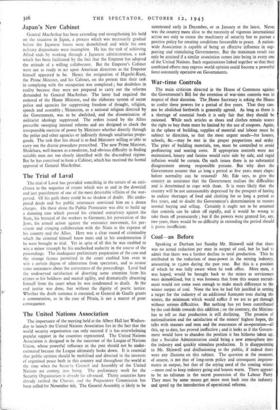Japan's New Cabinet
General MacArthur has been extending and strengthening his hold on the situation in Japan, a process which was necessarily gradual before the Japanese forces were demobilised and while his own military dispositions were incomplete. He has the task of achieving Allied ends by working through a Japanese administration, a task which has been facilitated by the fact that the Emperor has adopted the attitude of a willing collaborator. But the Emperor's Cabinet were not as ready to act upon American directives as the Emperor himself appeared to be. Hence the resignation of Higashi-Kuni, the Prime Minister, and his Cabinet, on the pretext that their task in complying with the occupation was completed ; but doubtless in reality because they were not prepared to carry out the reforms demanded by General MacArthur. The latter had required the removal of the Home Minister, and the elaborate system of secret police and agencies for suppressing freedom of thought, religion, speech and assembly ; Shintoism, as a national religion directed by the Government, was to be abolished, and the dissemination of militarist ideology suppressed. The orders issued by the Allies prescribe sweeping internal reforms and are designed to check the irresponsible exercise of power by Ministers whether directly through the police and other agencies or indirectly through totalitarian propa- ganda. The task that lies ahead is to find Ministers willing or to carry out the drastic procedure prescribed. The new Prime Minister, Shidehara, well-known as a moderate, had obvious difficulty in finding suitable men not too closely identified with the discredited regime. But he has contrived to form a Cabinet, which has received the formal approval of General MacArthur.


























 Previous page
Previous page